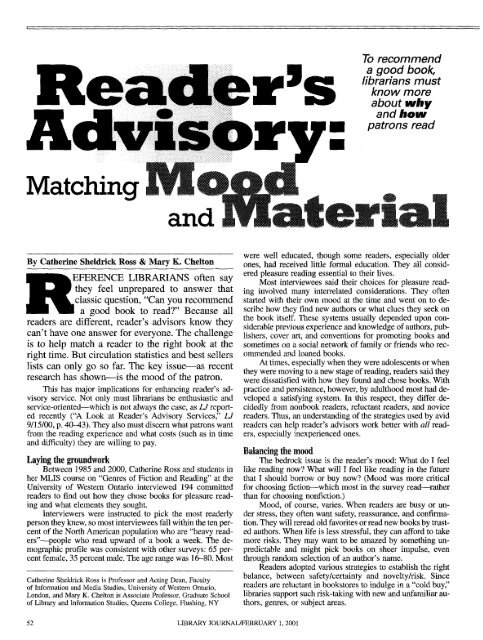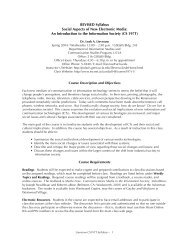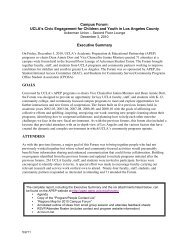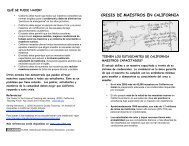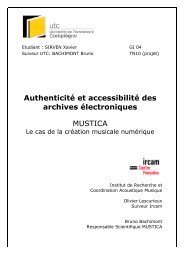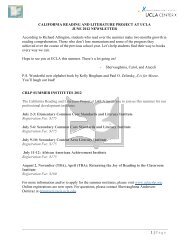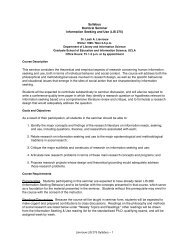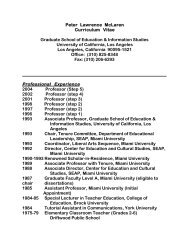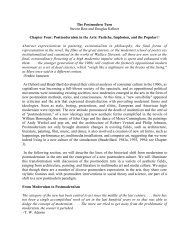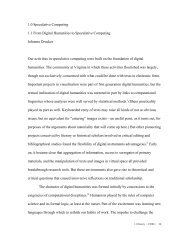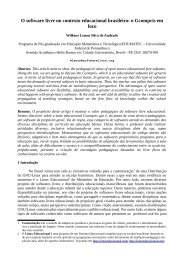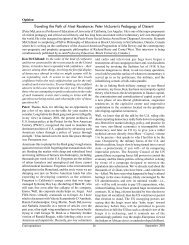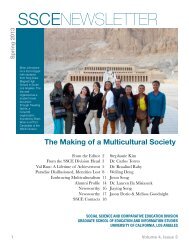Matching mood to material. - UCLA Department of Information Studies
Matching mood to material. - UCLA Department of Information Studies
Matching mood to material. - UCLA Department of Information Studies
Create successful ePaper yourself
Turn your PDF publications into a flip-book with our unique Google optimized e-Paper software.
<strong>Matching</strong><br />
By Catherine Sheldrick Ross & Mary K. Chel<strong>to</strong>n<br />
R EFERENCE LIBRARIANS <strong>of</strong>ten say<br />
they feel unprepared <strong>to</strong> answer that<br />
classic question, "Can you recommend<br />
a good book <strong>to</strong> read?" Because all<br />
readers are different, reader's advisors know they<br />
can't have one answer for everyone. The challenge<br />
is <strong>to</strong> help match a reader <strong>to</strong> the right book at the<br />
right time. But circulation statistics and best sellers<br />
lists can only go so far. The key issue-as recenit<br />
research has shown-is the <strong>mood</strong> <strong>of</strong> the patron.<br />
This has major implications for enhancing reader's advisory<br />
service. Not only must librarians be enthusiastic and<br />
service-oriented-which is not always the case, as LI reported<br />
recently ("A Look at Reader's Advisory Services," Ll<br />
9/15/00, p. 40-43). They also must discen what patrons want<br />
fromn the reading experience and what costs (such as in time<br />
and difficulty) they are willing <strong>to</strong> pay.<br />
Laying the groundwork<br />
Between 1985 and 2000, Catherine Ross and students in<br />
her MLIS course on "Genres <strong>of</strong> Fiction and Reading" at the<br />
University <strong>of</strong> Western Ontario interviewed 194 committed<br />
readers <strong>to</strong> find out how they chose books for pleasure reading<br />
and what elements they sought.<br />
Interviewers were instructed <strong>to</strong> pick the most readerly<br />
person they knew, so most interviewees fall within the ten percent<br />
<strong>of</strong> the North American population who are "heavy readers"-people<br />
who read upward <strong>of</strong> a book a week. The demrographic<br />
pr<strong>of</strong>ile was consistent with other surveys: 65 percent<br />
female, 35 percent male. The age range was 16-80. Most<br />
To recommend<br />
der's<br />
a good book,<br />
1 {librarians must<br />
know more<br />
..... ...................<br />
about w hy<br />
*and000000ggE0000:0;0igE.E------iand how<br />
h w -patrons read<br />
and<br />
Catherine Sheldrick Ross is Pr<strong>of</strong>essor and Acting Dean, Faculty<br />
<strong>of</strong> <strong>Information</strong> and Media <strong>Studies</strong>, University <strong>of</strong> Western Ontario,<br />
London, and Mary K. Chel<strong>to</strong>n is Associate Pr<strong>of</strong>essor, Graduate School<br />
<strong>of</strong> Library and Infonnation <strong>Studies</strong>, Queens College, Hlushing, NY<br />
52<br />
LIBRARY JOURNAL/FEBRUARY 1, 2001<br />
were well educated, though some readers, especially older<br />
ones, had received little formal education. They all considered<br />
pleasure reading essential <strong>to</strong> their lives.<br />
Most interviewees said their choices for pleasure reading<br />
involved many interrelated considerations. They <strong>of</strong>ten<br />
started with their own <strong>mood</strong> at the time and went on <strong>to</strong> describe<br />
how they find new authors or what clues they seek on<br />
the book itself. These systems usually depended upon considerable<br />
previous experience and knowledge <strong>of</strong> authors, publishers,<br />
cover art, and conventions for promoting books and<br />
sometiefmes on a social network <strong>of</strong> family or friends who recomnended<br />
and loaned books.<br />
At times, especially when they were adolescents or when<br />
they were moving <strong>to</strong> a new stage <strong>of</strong> reading, readers said they<br />
were dissatisfied with how they found and chose books. With<br />
practice and persistence, however. by adulthood most had developed<br />
a satisfying system. In this respect, they differ decidedly<br />
from nonbook readers, reluctant readers, and novice<br />
readers. Thus, an understanding <strong>of</strong> the strategies used by avid<br />
readers can help reader's advisors work better with all readers,<br />
especially inexperienced ones.<br />
Balancing the <strong>mood</strong><br />
The bedrock issue is the reader's <strong>mood</strong>: What do I feel<br />
like reading now? What will I feel like reading in the future<br />
that I should borrow or buy now? (Mood was more critical<br />
for choosing fiction-which most in the survey read-rather<br />
than for choosing nonfiction.)<br />
Mood, <strong>of</strong> course, varies. When readers are busy or under<br />
stress, they <strong>of</strong>ten want safety, reassurance, and confinnation.<br />
They will reread old favorites or read new books by trusted<br />
authors. When life is less stressful, they can afford <strong>to</strong> take<br />
more risks. They may want <strong>to</strong> be amazed by something unpredictable<br />
and might pick books on sheer impulse, even<br />
through random selection <strong>of</strong> an author's name.<br />
Readers adopted various strategies <strong>to</strong> establish the right<br />
balance, between safety/certainty and novelty/risk. Since<br />
readers are reluctant in books<strong>to</strong>res <strong>to</strong> ilndulge in a "cold buy,"<br />
libraries support such risk-taking with new and unfamiliar authors,<br />
genres, or subject areas.
Reader strategies<br />
Committed readers typically scan<br />
their everyday environments for clues<br />
about books <strong>to</strong> read next. Thev tuck away,<br />
in memory or on lists, the names <strong>of</strong> books<br />
Choosini I a 13ook<br />
for Pleas ure<br />
d Tle readling<br />
experience<br />
U waute4<br />
The most frequently mentioned<br />
"quick identifiers" were the cover, the<br />
blurb on the back, and the writing sample.<br />
The sample paragraph or page was<br />
<strong>of</strong>ten a final test, used as an indica<strong>to</strong>r <strong>of</strong><br />
and authors and develop a s<strong>to</strong>re <strong>of</strong> personal<br />
knowledge about authors, titles, and<br />
genres. They draw on tusted sources with<br />
tastes known <strong>to</strong> be compatible, including<br />
reviewers, friends, family members, selected<br />
books<strong>to</strong>re staff, and librarians,<br />
and-more recently-Internet acquaintances.<br />
Because <strong>of</strong> their strong conmmitment<br />
<strong>to</strong> reading, the readers in this study<br />
a Familiarity vs novelty<br />
the writing style and the level <strong>of</strong> literary<br />
w Safety vs,; ri .k , ... . , ^ . . ` . competence demanded by the book.<br />
U Easy vs ce1*h0nlmlnt<br />
g Upeatipoa<br />
sXs~->- ~eu Reasons for rejection.9+<br />
tSi<br />
hard4iitlingArl<br />
,nicerftiiCal The interviewed readers were em-<br />
iV Reassured s. L 0 0 : X V phatic about what they don't like and<br />
semulated/ frl( lhtenedt/amazed used cues on the book itself-e.g., foul<br />
..i.<br />
la Confirmig Motefs and values language or mass market fiction. Typi-<br />
_vs cws Sin 'q.hem ....... cally readers ruled out books with par-<br />
were a key alerting source for others.<br />
ticular content (<strong>to</strong>o much sex/violence/<br />
The single most important strategy<br />
for selection was <strong>to</strong> choose a book by a<br />
known and trusted author. Said a Salman<br />
Rushdie fan, "It's like finding a gold<br />
nine and following the vein," while a le<br />
Carr6 devotee said, "It's very safe <strong>to</strong><br />
know that you've got an author whom<br />
you like, and there are .1 eight more books<br />
sitting there waiting." After choosing by<br />
author, the second most popular strategy<br />
was <strong>to</strong> use genre. They also use clues<br />
provided by the book cover, the blurb on<br />
2<br />
Sources a Dut new books<br />
g Browsing ii bin:<br />
books<strong>to</strong>res<br />
or libraries s, rr noni<strong>to</strong>ring displays<br />
and "just ri retuirrned"<br />
she6vs<br />
U Recommer ations from friends,<br />
co-w'orkers s, {i e.ml.y<br />
,........<br />
-<br />
zr ar Ids inpopular media<br />
K ~~~~~~~~~~~~~<strong>of</strong><br />
Production tS( TV, movie, etc.)<br />
an authc<br />
. Jacket ..i ;or's<br />
......... s.work<br />
..... .i.....s Ors<br />
I.......... from libras .- -<br />
literary criti izel<br />
sor oter readers<br />
- -- .... .... ........ ..<br />
horror/pr<strong>of</strong>ane language); books with<br />
an undesired emotional effect ("makes<br />
me depressed"); books with unappeal-<br />
ing characters (drippy heroines, violent<br />
heroes. and alpha males); and books<br />
written in an unappealing style.<br />
When readers reject a book as<br />
"poorly written," they <strong>of</strong>ten mean that the<br />
book was successfully written <strong>to</strong> achieve<br />
an effect that they personally dislike-<br />
<strong>to</strong>o sexually arousing, <strong>to</strong>o scary, <strong>to</strong>o sentimental,<br />
<strong>to</strong>o full <strong>of</strong> verbal effects, <strong>to</strong>o dethe<br />
back, and samples <strong>of</strong> prose, eiffier the<br />
first paragraph or a random selection. Mnements i 0*<br />
a book<br />
scriptive, or <strong>to</strong>o literary for them. A fan<br />
<strong>of</strong> the stripped-down Hemingway style<br />
Keys <strong>to</strong> selection<br />
Typically, a single fac<strong>to</strong>r <strong>to</strong>ok<br />
precedence, with other fac<strong>to</strong>rs coming<br />
in<strong>to</strong> play. A reader might want a mystery<br />
s<strong>to</strong>ry, but the choice could depend<br />
on additional elements such as a smart<br />
female detective, love interest, or a regional<br />
setting. Another might say that<br />
W<br />
A<br />
u treate<br />
* Chracters --....... epioted<br />
* setting ~g. ......u<br />
Endin<br />
ij Physii elfze<br />
<strong>of</strong> the .. book<br />
....... ...<br />
.......I<br />
Clues on te book itself<br />
might dislike the sensuous language <strong>of</strong><br />
romance and declare that all romances<br />
are "poorly written." Not surprisingly,<br />
the most frequent response <strong>to</strong> the question<br />
about books that would not be chosen<br />
was <strong>to</strong> specify a particular genre, especially<br />
romance, Westerns, and horror.<br />
A feature that strongly attacted one<br />
reader could equally put <strong>of</strong>f another, but<br />
the major requirement is "nothing depressing<br />
or frightening," but she also<br />
= Author<br />
U9 Genre<br />
................ ......... in each case the information helped<br />
match book and reader For example, a<br />
wants <strong>to</strong> be "transported, moved in<strong>to</strong> a U Cover<br />
die-cut mauve cover with a title in cur-<br />
world that's different." ii Title<br />
sive, ornate lettering or a black cover<br />
For others, the book's size is key:<br />
"The third thing I look at [after author<br />
and the description on the back cover] is<br />
i Sample Paage<br />
i Publisher<br />
-. . -'.....-P............<br />
... .while<br />
spattered with gore each advertise themselves<br />
<strong>to</strong> their respective genre readers<br />
at the same time warning <strong>of</strong>f oth-<br />
the thickness. I will reject a book even if<br />
it's a book by an author whom I know if<br />
it's a small, little book.' In narrowing<br />
down choices, readers are strongly guided<br />
by what they don't want, so that they<br />
can quickly rule out whole categories<br />
("nothing <strong>to</strong>o long") and entire genres<br />
("the psychological thriller").<br />
s<br />
i<br />
X<br />
ccess as bookay<br />
1rinaEl[ectuil Xe book 0 0 i<br />
tn oM r01<br />
a icess ( riowledge <strong>of</strong><br />
Physicl a<br />
ass<br />
literarycoentions<br />
(time and work<br />
required <strong>to</strong>ig<br />
at it)<br />
... P. ... .. .....-..ss.<br />
a LeQ% <strong>of</strong>-+ ae Or commitment . ...<br />
requirec:b yt he book<br />
ers who dislike romance or horror. Read-<br />
ers stressed the need <strong>to</strong> evaluate cues critically,<br />
as covers can be deceptive.<br />
One reader chose books that won<br />
prizes, l while another said he avoided<br />
pnze winners because the basis for such<br />
prizes is usually "a type <strong>of</strong> literary ex-<br />
cellence that doesn't particularly make<br />
Once the reader starts <strong>to</strong> browse<br />
for enjoyable reading."<br />
within a range <strong>of</strong> books, then the cover and the clues provided The final fac<strong>to</strong>r in book selection involves the reader's<br />
on the book itself become important. Titles are also impor- calculation <strong>of</strong> the degree <strong>of</strong> work required <strong>to</strong> appropriate the<br />
tant-readers said they were drawn both <strong>to</strong> an unusual, catchy book, both physically and mentally. Some readers said that<br />
title (in the case <strong>of</strong> an unfamfiliar book) and <strong>to</strong> a familiar title they <strong>of</strong>ten read "what's around me" or "books I find at home."<br />
that struck a chord. One sf reader said, 'When you're as genre- Conversely, readers reported being willing <strong>to</strong> put themselves<br />
specific as I amn and read as voraciously as I do, you're look- on waiting lists, special-order, or pay hardcover prices <strong>to</strong> read<br />
ing for some quick identifiers on what's a good book. It'll take a book that they expected <strong>to</strong> yield much pleasure. It follows that<br />
me ten miinutes <strong>to</strong> go in [<strong>to</strong> the sf section], get five books, and people who want <strong>to</strong> promote a particular book choice can try <strong>to</strong><br />
leave because I'm just so familiar with the genre."<br />
convince the reader <strong>of</strong> its worth and also make it easier <strong>to</strong> find.<br />
LIBRARY JOURNAL/FEBRUARY 1, 2001<br />
53
Our analysis suggests that a comprehensive model for the<br />
process <strong>of</strong> choosing a book <strong>to</strong> read for pleasure must include<br />
five related elements, summarized in the chart, p. 53.<br />
What this means for you<br />
Reader's advisory service encompasses a range <strong>of</strong> techniques,<br />
from the personal and interactive (via an interview) <strong>to</strong> the<br />
impersonal and passive (such as displays or lists <strong>of</strong> suggested titles).<br />
However, wvhile library systems and readers use some <strong>of</strong><br />
the same categories <strong>to</strong> group <strong>to</strong>gether potential titles in meaningful<br />
ways, other categories important <strong>to</strong> readers are neglected.<br />
Librarians-and the published or web-based reader's advisory<br />
<strong>to</strong>ols they use-tend <strong>to</strong> categorize books by author,<br />
subject, setting, characters, genre, literary prize winners, and<br />
movie or TV tie-ins. While readers do use these categories,<br />
they also choose books by their appeal <strong>to</strong> emotion and <strong>mood</strong>,<br />
by selective personal or media sources, by browsing and<br />
serendipity, and by the "cost" involved. Librarians must pay<br />
more attention <strong>to</strong> these areas.<br />
I Responding <strong>to</strong> the reading<br />
experience wanted<br />
When librarans query readers at the desk, they should ask,<br />
"Tell me what you're in the <strong>mood</strong> for" or "Tell me what kind<br />
<strong>of</strong> reading experience you're looking for." This question<br />
should probably precede "Tell me about a book that you've<br />
read and enjoyed," which Joyce Saricks and Nancy Brown<br />
suggest in their indispensable Readers'Advisory Services<br />
for Adults in the Public Library (ALA, 1997). Asking<br />
about books they have previously read may be problematic<br />
if readers now want a different emotional experience.<br />
Categorizing titles by<br />
<strong>mood</strong> and emotion requires Emotional appeal:<br />
librarians <strong>to</strong> think beyond lit- Not alU Oprah's<br />
erary and <strong>to</strong>pical criteria for pit ks have upbeat<br />
grouping books. "Easy" and<br />
"familiar" in this regard be- endings, lke Tawa<br />
come desirable characteris- Road, amd some lova<br />
tics, not reasons for ignoring s<strong>to</strong>res, like Bidges<br />
either the s<strong>to</strong>ry or its potential<br />
readers. These catego- <strong>of</strong> Madison County,<br />
rizations also require looking are biftersweet<br />
at genres differently, since<br />
most genres at different levels encompass both familiarity and<br />
novelty, or both safety and risk. In genres such as sf. familiarity<br />
with the genre itself makes anything in the genre easy<br />
and well known if a reader is widely read in it, whereas almost<br />
anything in the genre is difficult or novel for those unfamiliar<br />
with its conventions. On the other hand, an appeal <strong>to</strong><br />
emotion and <strong>mood</strong> also allows for groupings across genres<br />
for readers when <strong>mood</strong> trumps genre.<br />
An easy way <strong>to</strong> exploit emotional appeal is <strong>to</strong> categorize<br />
s<strong>to</strong>ries by happy and sad endings or by upbeat and cynical<br />
<strong>to</strong>nes. This could be used <strong>to</strong> sort books appearing on lists <strong>of</strong><br />
award-winning or recommended books or books made familiar<br />
through course curricula. While Oprah's books all<br />
seem <strong>to</strong> feature women overcoming adversity, some readers<br />
would want <strong>to</strong> know that The Pilot's Wife is in no way upbeat<br />
with a happy ending, unlike Tara Road. Love s<strong>to</strong>ries include<br />
not only romance genre titles with the expected happy ending<br />
but also titles like Robert James Waller's Bridges <strong>of</strong> Madison<br />
County, Wilbur Smith's Eagle in the Sky, or Hilma<br />
Wolitzer's Endings, all <strong>of</strong> which are, if not sad, at least bit-<br />
54<br />
I.IBRARY JOURNAL/FEBRUARY 1, 2001<br />
tersweet Even within a specific genre framework such as romance<br />
with its inevitably happy endings, some authors are<br />
also hilariously funny, such as Cathie Linz, Jennifer Crusie,<br />
and Susan Elizabeth Phillips, while authors like Judith Duncan<br />
<strong>of</strong>fer <strong>mood</strong>y and <strong>to</strong>rmented s<strong>to</strong>ries.<br />
Familiarity and novelty can make an interesting way <strong>to</strong><br />
split promotion for subcategories. For example, within horror,<br />
part <strong>of</strong> Stephen King's appeal is the way he uses very familiar<br />
settings such as the supermarket, whereas the unusual Calcutta<br />
setting itself is the actual horror in Dan Simmons's awardwinning<br />
Sonig <strong>of</strong> Kali. Caleb Carr's The Alienist fascinates<br />
many readers because <strong>of</strong> its clever use <strong>of</strong> Vic<strong>to</strong>rian mores and<br />
setting, whereas other mystery readers prefer more famniliar,<br />
contemporary settings.<br />
Librarians doing reader's advisory work can use these<br />
emotional categories <strong>to</strong> create synonyms or euphemisms for list<br />
and display titles and the books <strong>to</strong> go with them. Words and<br />
phrases like "clean," "faithful," and "tried and true" can be<br />
used for familiar, safe, reassuring s<strong>to</strong>nes. "Provocative," "unusual,"<br />
"shivery," "gritty,' or "different takes" can be used for<br />
challenging, critical, frightening, hard-hitting, or new perspective<br />
s<strong>to</strong>ries, respectively.<br />
2 Responding <strong>to</strong> the need for<br />
sources about new books<br />
Most libraries already post the New York Times and other local<br />
best sellers lists, the Oprah book lists, as well as the American<br />
Library Association's Notable Books lists from the Reference<br />
and User Services Association. This form <strong>of</strong> reader's<br />
advisory promotion can be expanded. A bulletin board <strong>of</strong> ads<br />
cut or copied from newspapers and magazines<br />
for books, including<br />
the weekly genre and<br />
....... .. category notices from<br />
Amazon.com, might<br />
.... help readers.<br />
A labeled shelf<br />
and list <strong>of</strong> current or re-<br />
; i - cent movie and TV<br />
t a _E-E-.gEEi ---- dramatizations <strong>of</strong> books<br />
should be a staple <strong>of</strong><br />
""'7 2 reader's advisory. Inviting<br />
known, influential<br />
narra<strong>to</strong>rs <strong>to</strong> read from favorite s<strong>to</strong>ries for a National Library<br />
Week program or <strong>to</strong> name them for an annotated giveaway<br />
list and display is another tactic.<br />
One technique not <strong>of</strong>ten exploited is <strong>to</strong> make available recormmendations<br />
from friends, co-workers, or other personally<br />
known individuals. With the permnission <strong>of</strong> the recommender, libraies<br />
could easily create lists <strong>of</strong> recommended boolks, organized<br />
by the name and position <strong>of</strong> the person making the recommendation.<br />
A form <strong>to</strong> elicit recommendations could be developed<br />
and inserted in books and videos, and returned formLs<br />
could be grouped in a notebook at the service desk or on the library's<br />
web site. This is similar <strong>to</strong> Amazon's lists <strong>of</strong> books also<br />
bought by the same people who purchased the title <strong>of</strong> interest.<br />
Libraries must improve browsability <strong>to</strong> help readers<br />
choose books by serendipity. Much <strong>of</strong> this is covered in<br />
Sharon Baker's Responsive Public Library Collection:<br />
How To Develop and Market It (Libraries Unlimited,<br />
1993). Merchandising goes far beyond lists and displays,<br />
emphasizing the strategic use <strong>of</strong> space, especially in four<br />
areas: the entrance or "front end" <strong>of</strong> the library, the ends
<strong>of</strong> stacks, high traffic areas, and the circulation desk area.<br />
All four <strong>of</strong> these "magic spots" should be filled with<br />
books, not posters, signs, community announcements, or anything<br />
else librarians <strong>of</strong>ten put there. Although most online circulation<br />
systems make it possible <strong>to</strong> note changes in shelf location,<br />
merchandised titles usually circulate so fast that it may<br />
not be worth the effort. The idea that everything on the shelves<br />
should be in alphabetical or classification order is antithetical<br />
<strong>to</strong> the browsing needs <strong>of</strong> readers.<br />
3 Responding <strong>to</strong> the<br />
3elements <strong>of</strong> a book<br />
Subjects and settings are usually well indexed in reader's advisory<br />
services and <strong>to</strong>ols, and characters. are indexed <strong>to</strong> some<br />
extent. But librarians or those producing reader's advisory<br />
<strong>to</strong>ols have yet <strong>to</strong> exploit treatment, types <strong>of</strong> beginnings and<br />
endings, physical size, and combinations there<strong>of</strong>. Wouldn't a<br />
"Fat Reads" list revive Helen Hooven Santmnyer's ...And<br />
Ladies <strong>of</strong> the Club?<br />
Some stressed-out readers might want a list <strong>of</strong> titles for<br />
"Vegging Out." Since readers use these fac<strong>to</strong>rs in combination,<br />
something like "Long Sad S<strong>to</strong>ries" may also work quite<br />
well. Subscribers <strong>to</strong> the electronic mailing list Fiction-L recently<br />
discussed promoting books by their first lines, which<br />
is exactly what the First Lines web site-produced by a Cornell<br />
librarian and engineer (www.people.cornell.edu/pages/<br />
jad22)-has already exploited.<br />
Responding <strong>to</strong> clues<br />
on the book itself<br />
These fac<strong>to</strong>rs should be used <strong>to</strong> group titles by pnmary and<br />
secondary fac<strong>to</strong>rs in combination, such as mystery + smart<br />
female detective, or nothing depressing + something transporting.<br />
Since size is important, groupings like "Small but Serious"<br />
or "Long on Laughter" make sense, even if the resulting<br />
lists are quite eclectic. Since readers also use these fac<strong>to</strong>rs<br />
<strong>to</strong> exclude titdes, librarians could make exclusions a clear<br />
part <strong>of</strong> promoted categories. Examples might be "Bloodless<br />
Mysteries" or "Romantic sf."<br />
Since the author is crucial, we should inform readers when<br />
an author changes direction, whether in style, subject matter, or<br />
genre. Under the pseudonym J.D. Robb, Nora Roberts's futuristic,<br />
gritty cop/romance s<strong>to</strong>ries are avidly read by her fans in<br />
large part because her publisher and publicist have gone <strong>to</strong> great<br />
pains, even at the expense <strong>of</strong> alienating potential sf readers, <strong>to</strong><br />
alert her romance readers <strong>to</strong> the change in style and subject matter<br />
Her books are shelved in books<strong>to</strong>res with romance titles,<br />
and all publicity reads, "Nora Roberts writing as J.D. Robb."<br />
To help readers make more informed choices, librarians<br />
can produce lists, shelf alerts, and displays <strong>of</strong> popular authors<br />
who either write under a pseudonym or write different kinds<br />
<strong>of</strong> books under the same name. Working librarians know that<br />
audiobook listeners also choose titles by author, and so many<br />
<strong>of</strong> these suggestions apply also <strong>to</strong> the audiobook formnat.<br />
Since raders use covers and sample pages <strong>to</strong> choose titles,<br />
they can be helped by a display <strong>of</strong>-or web site links <strong>to</strong>-covers<br />
and sample pages or paragraphs. Less avid or novice readers<br />
<strong>of</strong> a new genre may also need help interpreting covers. Orson<br />
Scott Card, who has written both sf and fantasy, points out that<br />
readers can tell the difference between these genres because sf<br />
covers show nvets and fantasy covers show trees. Likewise, sensual<br />
romances have a lot <strong>of</strong> red and swirly letters, whereas sweet<br />
romances are usually covered in virginal white. Adding a de-<br />
scription <strong>of</strong> "how <strong>to</strong> read a cover" <strong>to</strong> lists, or creati g a list and<br />
display called "How To Read a Cover." with sugge: sted authors<br />
or titles for each type <strong>of</strong> cover, should help novice r eaders.<br />
Responding <strong>to</strong> the<br />
cost in time or money<br />
Patrons must balance the expected pleasure in reading a particular<br />
book against the cost involved <strong>to</strong> get it. Libraries<br />
should have enough copies <strong>of</strong> a title at the time people want<br />
it, whether it's a best seller, an Oprah title, a book <strong>to</strong> be discussed<br />
at the next book discussion group meeting, or a book<br />
the librarian is reviewing for a group.<br />
While librarians might say that making popular titles<br />
available is more <strong>of</strong> a collection development rather than a<br />
reader's advisory problem, it is a shared problem. There's<br />
simply no point in promoting a title, or taking advantage <strong>of</strong><br />
the broadcast media's promotion, if the interest and demand<br />
only build longer and longer reserve queues. The longer the<br />
queue, the higher the "cost" in waiting time <strong>to</strong> get the book.<br />
While each library must answer for itself and <strong>to</strong> its readers<br />
the acceptable length <strong>of</strong> a reserve queue, every library can <strong>of</strong>fer<br />
alternatives. The number <strong>of</strong> Oprah's recommended books is now<br />
large enough that other Oprah choices can be <strong>of</strong>fered. The Harry<br />
Potter phenomenon, however, has spawned a new kind <strong>of</strong> list:<br />
"Books To Read While You Wait for the Next Harry Potter<br />
Book." Another technique is <strong>to</strong> split the order <strong>of</strong> titles so that half<br />
go <strong>to</strong> fill reserves and the other half <strong>to</strong> occupy "express" shelves<br />
on a no-reserve, first-come, first-served basis.<br />
Librarians also should understand and indicate the intellectual<br />
work involved in reading particular titles, whether genre<br />
or mainstream. For example, Dan Simmons's Hvperion, Larry<br />
Niven's Ringworld, and Arthur C. Clarke's Rendezvous with<br />
Rama are all mesmerizing s<strong>to</strong>ries for sophisticated sf fans but<br />
not for novices. While sf always demands a <strong>to</strong>lerance for unusual<br />
settings, themes, and vocabulary, it also can demand a<br />
mental visual acuity and patience with a lack <strong>of</strong> not only characterization<br />
but also-in the case <strong>of</strong> Rendezvous with Ramahuman<br />
(or sentient) protagonists.<br />
Sf is not the only genre in which readers need <strong>to</strong> be alerted<br />
<strong>to</strong> the demands <strong>of</strong> the text. Frank McCourt's Angela's Ashes is<br />
inspiring <strong>to</strong> a great many readers but quite depressing <strong>to</strong> others.<br />
While readers differ in their perception <strong>of</strong> the effort involved in<br />
getting or reading a particular book, it is important <strong>to</strong> include an<br />
acknowledgment <strong>of</strong> the cost fac<strong>to</strong>r both in conversations with<br />
readers and in passive techniques such as displays and lists.<br />
Let's do it better<br />
By acknowledging <strong>mood</strong> and cost, in conjunction with<br />
the criteria normally used by librarians <strong>to</strong> categorize books.<br />
librarians can revolutionize reader's advisory work. The conclusions<br />
should not lead librarians <strong>to</strong> abandon current strategies<br />
but rather <strong>to</strong> add on <strong>to</strong> existing successful techniques.<br />
Thematic and <strong>to</strong>pical lists, such as those regularly generated<br />
on Fiction-L, can now be scrutinized in a slightly different<br />
way, so that they become, in fact, subcategories <strong>of</strong> larger<br />
emotional categories. What is needed for books is a <strong>to</strong>ol like<br />
Nancy Peske's and Beverly West's Cinematherapy: The Girl's<br />
Guide <strong>to</strong> Movies for Every Mood (Dell, 1999), the back cover<br />
<strong>of</strong> which says, 'Every woman knows.. .Movies are More than<br />
Just Entertainment-They're Self-Medication."<br />
Well, avid readers know that about books, <strong>to</strong>o. Librarians<br />
just need <strong>to</strong> open their imagination <strong>to</strong> these new possibilities<br />
for serving all readers, from avid ones <strong>to</strong> novices. O<br />
LIBRARY JOURNALJEIBRUARY 1, 2001 s5X
COPYRIGHT INFORMATION<br />
TITLE: Reader’s advisory: matching <strong>mood</strong> and <strong>material</strong><br />
SOURCE: Library Journal 126 no2 F 1 2001<br />
WN: 0103201872012<br />
The magazine publisher is the copyright holder <strong>of</strong> this article and it<br />
is reproduced with permission. Further reproduction <strong>of</strong> this article in<br />
violation <strong>of</strong> the copyright is prohibited. To contact the publisher:<br />
http://www.cahners.com/.<br />
Copyright 1982-2002 The H.W. Wilson Company. All rights reserved.


